
- Privacy policy
- Terms and conditions

Essay on Social evils in Nepal-2021

SOCIAL EVILS

WHAT IS SOCIAL EVIL?
The anti-social practices prevalent in the society are said to be social evils. These practices harm the society and its good social tradition. Those evils must be rooted out for the prosperity of the people and the country as soon as possible.
EXAMPLE OF SOCIAL EVILS
The people of different nature and attitude live in a society. Good people do well to the society where as the bad one harms the society. These bad people introduce social evils like theft, robbery, untouchability and other forms of social discrimination. Early marriage, polygamy, dowry system, drug addiction, girls trafficking etc. are other examples of social evils. They harm the feeling of equality and mutual respect.
CONSEQUENCES OF SOCIAL EVILS
Social evils are increasing rapidly. Robberies are committed in broad daylight. We often hear robbers robbing a bank. Smugglers carry out their business farelessly. Public are unsafe. Women are raped in public. Wishing to be rich overnight idols are smuggled, girls are trafficked, youth are lured to addiction. The poor girls are allured for money, threatened and compelled to involve in prostitution. The young children have been the drug addicts. On the account of their bad habit, they do not hesitate to steal things and commit crimes.
Our country is facing those problems at present. They exist because of the ignorance of the people. Most of the people are uneducated in developing countries like Nepal. They do not know about the way to fight against the social evils. They are mostly traditional minded. Therefore, they have strong faith in superstition. They regard untouchability, dowry and some other practices as their tradition. They strongly support them rather than discarding. Similarly, government and civil society seem to be quite ignorant toward these problems. It is the duty of the government to carry out effective programs to educate the people against these problems and punish those who encourage these evils in the society. The smugglers and traffickers must be strictly punished. The role of civil society is vital to fight against these evils because they can easily aware and educate the local people in the society against them.
SOLUTIONS FOR SOCIAL EVILS
To sum up, elimination of social evils has been the urgent need of the country. It can be eliminated with the joint effort of the government, people, civil society and other social organization. If they are not checked on time our future will be nowhere.

Posted by Nepticle Blog
You may like these posts, post a comment, popular posts.

Essay on 'Tourism in Nepal' in 250 words
TOURISM IN NEPAL We want to visi…

SOCIAL EVILS …

why do geese fly in v formation?2022
SUB-CONSCIOUS MIND Longman dictionary defines sub-conscious as the par…
- Book articles
- environmentalpollution
- formationofFossil
- human brain
- importance of agriculture
- pleasure of reading
- Rights and duties
- rivers in nepal
- student life
Featured post

Structures and Function of brain

Hello Everyone! Welcome to my blog. Here you can find any articles related to General knowledge, creative stories, articles on different subjects, Essay writting, photography and so on.
- anti-social practices (1)
- Articles (24)
- Be positive (1)
- Book articles (1)
- children day special (1)
- conscious mind (1)
- creativity (1)
- cyber law (1)
- Democracy (1)
- dowry system (1)
- drug addiction (1)
- Education (1)
- environmentalpollution (1)
- excursion (1)
- Forest in Nepal (1)
- formationofFossil (1)
- health is wealth (1)
- history (1)
- history of earth (1)
- human brain (1)
- importance of agriculture (1)
- internet (1)
- multimedia (1)
- newspapers (1)
- patriotism (1)
- pleasure of reading (1)
- quiz time (1)
- Rights and duties (1)
- rivers in nepal (1)
- social service (1)
- student life (1)
- student mind (1)
- subconscious in plants (1)
- tourism industry (1)
- unix and linux (1)
- value of science (1)
Most Popular

Essay on democracy in Nepal in 250 words.
DEMOCRACY IN NEPAL Democracy is a …
.png)
Essay on Student life in 250 words
STUDENT LIFE The period of a human life spent at school or college for …

Essay on rights and duties in 250+ words
RIGHTS AND DU…
HUMAN BRAIN Brain There are vario…

Essay on importance of women education in Nepal in 300 words
IMPORTANCE OF WOMEN EDUCATION IN NEPAL WHAT IS EDUCATION? Education …

essay on science and human values in 300 words
THE VALUE OF SCIENCE The present of era is t…

essay on environmental pollution in 250 words-Nepal-2022
ENVIRONMENTAL POLLUTION Environment simply…

Essay on pleasures of reading | School Essay | College Essay-2021
PLEASURES OF READING …
Social Widget
Content Search
Nepal must now deliver on promise of social justice - un human rights expert [en/ne], attachments.

KATHMANDU (9 December 2021) – Nepal has one of the most progressive constitutions in the world, but many of its promises still are to be fulfilled, the UN Special Rapporteur and extreme poverty and human rights, Olivier De Schutter, said today after conducting an 11-day official mission to the country.
Nepal has succeeded in reducing multidimensional poverty by 12.7 percent between 2014 and 2019, and its Human Development Index has improved, as have indicators related to health and education. But significant gaps remain,” the UN expert said.
“Women are still lagging on a number of indicators. Though banned, caste-based and ethnicity-based discrimination remain a reality in social life, and it is a major factor explaining the perpetuation of poverty. Land issues remain unresolved, despite the efforts to accelerate the rehabilitation of former bonded laborers and to ensure landless Dalit benefit from land redistribution.”
Poverty reduction owes more to remittances than to proactive Government anti-poverty policies, De Schutter said. "A quarter of the decline in poverty can be attributed to outmigration only, with estimates showing that, without remittances, poverty would have increased in Nepal,” he said. Remittances in Nepal were 10 times larger than foreign aid and 2.5 larger than total exports only in 2017. “It is clear that much more needs to be done by the Government to meet its own target of reducing multidimensional poverty to 11.5 percent by 2023-2024,” the expert said.
“The Government should ensure its skills and training programs reach the poorest families. While public works programs such as the Prime Minister’s Employment Program have considerable potential, in practice the program has yet to deliver on its promise of providing 100 days of work per person per year.
“In the country, 80 percent of workers are informal, which exposes them to higher rates of abuse, largely because the Government lacks the ability to enforce minimum wage legislation in the informal sector. Although informal workers should also contribute to and benefit from the Social Security Fund, there is currently no plan to include them in the program.”
De Schutter’s fact-finding mission began on 29 November, just weeks after the UN General Assembly voted a resolution inviting Nepal, along with Bangladesh and Lao People’s Democratic Republic, to prepare for graduation from the status of Least Developed Country (LDC) to that of an emerging economy. The country will benefit from a five-year transition period. “Graduation from LDC status is a major milestone for Nepal,” said De Schutter. “Poverty reduction must be at the heart of the country’s transition strategy to ensure that no groups are left behind.”
The UN expert met with communities who suffer from intersecting forms of deprivation. Most were landless daily wage laborers working in agricultural or informal jobs and struggling to send their children to school. Many were from historically disadvantaged and discriminated groups including Dalit, Madhesi, and Indigenous people, as well as women. “The stark inequalities resulting from the deeply entrenched norms and values of the Nepali caste system continue to perpetuate disadvantage today,” De Schutter said.
Women suffer the brunt of a historically patriarchal society, earning almost 30 percent less than men, suffering from higher rates of informality, owning only 19.7 percent of homes and land, and enduring a 17.5 percent literacy gap compared to men, the UN poverty expert noted. "Nepal can and must do better,” he said.
Children experience the worst forms of deprivation because of the poverty their families face, he added. Over one million children work in Nepal, and in rural areas over a fifth of children do.
“During my mission, I met with countless families whose children, especially girls, engaged in agricultural or domestic work,” De Schutter said. “Wealth inequality is a major factor: over 20 percent of children in poverty work, compared to only five percent of children from rich families.
“The Government must take child poverty seriously and take the necessary steps to end child marriage and labor and improve quality of and access to education,” he added.
During his mission, the Special Rapporteur visited Bagmati, Karnali, Lumbini provinces, as well as Province 2. He met with nine ministries, including six ministers, as well as local and provincial authorities, people affected by poverty, civil society organizations, and development cooperation and UN agencies.
Photos from the Special Rapporteur’s visit to Nepal are available for journalists’ use at https://bit.ly/3dumvJJ
Mr. Olivier De Schutter was appointed as the UN Special Rapporteur on extreme poverty and human rights by the UN Human Rights Council on 1st May 2020. The Special Rapporteurs are part of what is known as the Special Procedures of the Human Rights Council. Special Procedures, the largest body of independent experts in the UN Human Rights system, is the general name of the Council's independent fact-finding and monitoring mechanisms that address either specific country situations or thematic issues in all parts of the world. Special Procedures experts work on a voluntary basis; they are not UN staff and do not receive a salary for their work. They are independent from any government or organisation and serve in their individual capacity.
For more information and media requests, please contact Simrika Sharma (+977 9841592692 [email protected] and Isabelle Delforge (+32498522163 [email protected] or [email protected])
For media inquiries related to other UN independent experts, please contact Renato Rosario De Souza ([email protected]) or Jeremy Laurence (+ 41 79 444 7578 / [email protected]). Follow news related to the UN’s independent human rights experts on Twitter @UN_SPExperts. Follow the Special Rapporteur on social media at @DeSchutterO and @srpoverty Concerned about the world we live in? Then STAND UP for someone’s rights today.
Standup4humanrights
and visit the web page at http://www.standup4humanrights.org
Related Content
Nepal + 8 more
UNICEF South Asia Regional Humanitarian Situation Report No. 1 for 1 January to 31 March 2024
Nepal 2024 ifrc network country plan (upl-2024-maanp001), nepal: dengue response - dref final report (mdrnp014), progress and lessons learned - dengue prevention and control dref (june to december 2023).
Social Problems and Evils with causes and solutions
Filter course, we, our community and our nation.
- History of Society
- Socialization
- District Development Committee(DDC)
- Transportation and Communication
Our Social Values and Norms
- Our Social Custom
- Folk Culture
- Nation and Nationality and Some National Personalities
Social Problem and Solution
- Role of an Individual, Family and School to prevent Social Problems
Civic Sense
- Federal State
- Child Right and Duties
- Social Rules and Social Equity
- Factors of Topographical Change & Climate Change
- Physical Features of Nepal
- Medieval Period of Nepal
- Hwang-Ho Valley Civilization and Mesopotamian Civilization
Population Education and its Importance
- Population Education
- Population Growth in Nepal
Our Economic Activities
- Natural Resources of Nepal
- Agriculture, Trade, Industry, and Services and other occupation
International Understanding
- Landlocked Countries
Published by: Nuru
Published date: 24 Jan 2022
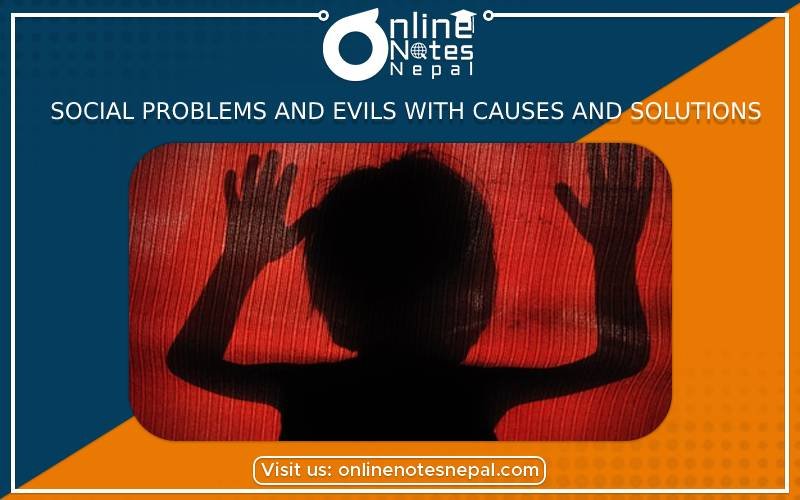
Social Problems and Evils with causes and solutions describe different social problems and evils prevalent in our country with causes and solutions.
Social Problems and Evils
Nepal is one of the underdeveloped countries of the world. There are different social problems and evils in the society. Social problems and evils are issues which affect the members of a society. A social problem is normally a term used to describe problems with a particular area or group of people in the world.
Some of the common social evils would be alcoholism, racism, child abuse, etc. It also affects how people react to certain situations. Social problems and evils are the things that would be considered harmful or dangerous to a society and community.
a. Caste Discrimination
Caste Discrimination was the root cause of the 'civil war' in Nepal. It is also one of the major social problems and evils of Nepal. The traditional thoughts that Brahmins, at the top and Dalits (labourers, cobblers, tailors) in the lowest position within the society, is the major cause of caste discrimination. The practice of untouchabilityis one example of discrimination against Dalits. Caste divisions cause problems in families, employment, marriage, and general social interaction. Unless caste system is eliminated from the society, there is no possibility of effective development of the country.
b. Gender Discrimination
In the context of Nepal, still many people consider women as weak in comparison to men. Many people still think that women are created to serve men. People still treat daughters as some commodities which can be traded among the people. Many people still believe that girls should not be educated. The parents aborting a baby girl is one of the main examples of gender discrimination in our society. Although there is a good law in our country, its implementation is not as effective as it should be.
c. Early Marriage and Dowry System
Our societies are also suffering from the problem of early marriage and dowry system. There is a belief that grown-up daughters are not supposed to be kept in home for the too long time so their marriage is done in the early age, which causes mental and physical problems and then causes the pre-mature death of the mother. The problem of dowry system has become quite terrible in many parts of Nepal. When the demand of dowry are not met, the girl is sometimes burnt and thrashed to death by the family members. The reason why many parents don’t want to have daughters is that the parents don't have to face the dowry demand in her marriage.
d. Alcoholism
Drinking of alcohol results in problems. It is also one of the social problems and evil of the country. The use of alcohol, smoking, addiction to drugs, is devouring the youth of the country. Some of them really don’t know the effects of such habits. If a man gets drunk, then he behaves uncontrollably. It affects the family, society and nation. The money isunnecessarilywasted. One who has surrendered to such bad habits is not aware of how it disturbs the psychology of the family members. Long-term misuse of alcohol can cause a wide range of mental health problems.
e. Corruption
Corruption is a form of dishonesty or abuse of entrusted power for private gain. It is an illegal act of an office-holder. Corruption occurs when an office-holder or other government employee acts in an official capacity for the personal gain. Corruption is a big problem of the society as well as nation. Corruption has trickled into both private and public sectors. Yet, fighting against corruption is difficult but not impossible. It requires a new order of incentive structures so that individuals change their behavior to think differently, show differently and act differently.
f. Child abuse
Child abuse is doing something that results in harm to a child. Child abuse can be physical, sexual or emotional. Most abused children suffer greater emotional than physical damage. It is also one of the social problems or evil of the society. Unemployment and financial difficulties are associated with increased rates of child abuse. Parents who physically abuse their spouses are more likely than others to physically abuse their children.
Poverty is the general scarcity or the state of one who lacks a certain amount of material possessions or money. It is also one of the social problems of the country. It refers the lack of means necessary to meet basic needs such as food, clothing and shelter. It is also one of the social problems and evil of the country. To reduce poverty, modernization of agriculture such as fertilizers, to provide enough food to feed the population is required.
Deuki is an ancient custom practiced in the Far Western Region of Nepal, in which a young girl is offered to the local temple to gain the religious merit. After offering the girls to the temples, neither parents nor couples who bought them provide any financial assistance or have additional contact with deuki. This can result in various mental and physical problems.
Causes and Solutions of Social Problems
Causes of social problem.
Social problems are the general factors that affect the society. Social problems often involve problems that affect real life. It also affects how people react to certain situations. People practice and promote social evils because they are ignorant of the adversities. There are lots of NGOs and INGOs which are working to eliminate social problems. The awareness programs they introduce do not reach to the actual victims. Some causes of social problems are listed below:
a. Unemployment
Unemployment occurs when a person who is actively searching for employment is unable to find work. Unemployment is one of the causes of social problems. It leads to the frustration. Due to unemployment, problems like burglary, loot, murder, theft arises.
Poverty is the lack of a certain amount of material possessions or money. It includes social, economic, and political elements. Poverty causes lack of food, health services and others. Rural people in Nepal generally have large families, very small landholdings or none at all, and high rates of illiteracy. Because of poor growth in the agricultural sector, living standards in rural areas causes poverty. The growing population has put heavy pressure on cultivable land.
c. Rapid population growth
Rapid population growth is the increase in the number of individuals. Over-population is caused by the number of factors. It leads to the unemployment and poverty.
d. Urbanization
Urbanization is the population shift from rural to urban areas. Urbanization creates enormous social, economic and environmental changes, which provide an opportunity for sustainability with the potential to use resources more efficiently. It is the cause of social problems. It is believed that living in a city can provide opportunities, diversity, and marketplace competition. As against this, there may be stress, increased cost of living, and negative social aspects that result from a mass.
e. Lack of education
Lack of education is one of the causes of social problems. People without good education are at risk from a lifetime of poor diet, long manual working and worsening mental health. Lack of education can have serious effects on children and adults and can affect health, living conditions and social situations. Due to lack of education, people do not take care of themselves because they are less educated about topics such as family planning and proper hygiene.
f. Superstitious beliefs
The superstitious beliefs which are deeply rooted in Nepalese societies are also promoting social problems. People believe in various traditions which would not let an individual to progress. This happens because people are innocent. They are not conscious about the consequences of their beliefs and practices. Such people can be easily convinced and cheated. People in rural areas still visit dhamis and jhankris.
g. Gender Discrimination
Our society is highly influenced by gender discrimination. Most of the domestic decisions are finalized by the males. Most of the time discrimination may not be visible on the surface. Even our religious scriptures are considered full of such stories which show women under the subjugation of their male counterpart.
h. Caste Discrimination
Lots of people are victimized in the name of caste. This happens because people have been divided as touchable and untouchables. This sort of discrimination occurs because the so-called higher caste does not regard others as fellow human beings. They are not aware that everyone is born equal. Lack of education, remaining stuck to old traditions, unwillingness to change, lack of consciousness are at the core of such discrimination.
i. Lack of guidance to youngsters
Many of the younger generation fall easily to bad habits. In the absence of proper guidance and counseling they are involved in various anti- social behaviour like stealing, robbery, murder, kidnapping etc. They prefer expensive gadgets just to exhibit them in front of their friends. They feel proud when they give a false impression of being rich and wealthy. They should not copy or get impressed by the false life of the celebrities and expensive commercial movies. Parents, teachers and educated members of the society should give proper guidance and advise them.
Solution of Social Problems are described below in brief:
The solution of the social problem is to be found in the problem itself. Social problems refer to any undesirable condition that is opposed either by the whole society or by a section of the society. Social problems and evils are the barriers to development and progress.
Nepal is facing a large number of social problems such as caste system, child labour, illiteracy, gender inequality, superstitions, religious conflicts and much more. A single person is not responsible for these social problems. It is high time to get relief of these undesirable social evils. Illiteracy and poverty are also the major root causes of social evils. We have discussed the social problems and their causes in the previous chapter.
Some of the major solutions are as follow:
- Mass awareness
- Positive attitude
- Search Menu
- Browse content in Arts and Humanities
- Browse content in Architecture
- Theory of Architecture
- Browse content in History
- History of Education
- Regional and National History
- Browse content in Philosophy
- Feminist Philosophy
- Philosophy of Language
- Browse content in Religion
- Religious Studies
- Browse content in Society and Culture
- Cultural Studies
- Ethical Issues and Debates
- Technology and Society
- Browse content in Law
- Comparative Law
- Criminal Law
- Environment and Energy Law
- Human Rights and Immigration
- Browse content in International Law
- Public International Law
- Legal System and Practice
- Medical and Healthcare Law
- Browse content in Medicine and Health
- Browse content in Public Health and Epidemiology
- Public Health
- Browse content in Science and Mathematics
- Browse content in Earth Sciences and Geography
- Environmental Geography
- Urban Geography
- Environmental Science
- Browse content in Psychology
- Social Psychology
- Browse content in Social Sciences
- Browse content in Anthropology
- Anthropology of Religion
- Browse content in Business and Management
- Business Ethics
- Business History
- Corporate Social Responsibility
- Human Resource Management
- Industry Studies
- Information and Communication Technologies
- Knowledge Management
- Criminology and Criminal Justice
- Browse content in Economics
- Behavioural Economics and Neuroeconomics
- Economic History
- Economic Systems
- Economic Development and Growth
- Financial Markets
- History of Economic Thought
- Public Economics
- Browse content in Education
- Educational Strategies and Policy
- Higher and Further Education
- Philosophy and Theory of Education
- Browse content in Human Geography
- Political Geography
- Browse content in Politics
- Asian Politics
- Comparative Politics
- Conflict Politics
- Environmental Politics
- European Union
- Indian Politics
- International Relations
- Middle Eastern Politics
- Political Economy
- Political Sociology
- Political Theory
- Public Policy
- Russian Politics
- Security Studies
- UK Politics
- US Politics
- Browse content in Regional and Area Studies
- Asian Studies
- Browse content in Social Work
- Care of the Elderly
- Child and Adolescent Social Work
- Couple and Family Social Work
- Developmental and Physical Disabilities Social Work
- Direct Practice and Clinical Social Work
- Human Behaviour and the Social Environment
- International and Global Issues in Social Work
- Mental and Behavioural Health
- Social Justice and Human Rights
- Social Policy and Advocacy
- Social Work and Crime and Justice
- Social Work Macro Practice
- Social Work Practice Settings
- Social Work Research and Evidence-based Practice
- Welfare and Benefit Systems
- Browse content in Sociology
- Childhood Studies
- Community Development
- Comparative and Historical Sociology
- Economic Sociology
- Gender and Sexuality
- Gerontology and Ageing
- Health, Illness, and Medicine
- Marriage and the Family
- Migration Studies
- Occupations, Professions, and Work
- Organizations
- Population and Demography
- Race and Ethnicity
- Social Theory
- Social Movements and Social Change
- Social Research and Statistics
- Social Stratification, Inequality, and Mobility
- Sociology of Religion
- Sociology of Education
- Urban and Rural Studies
- Reviews and Awards
- Journals on Oxford Academic
- Books on Oxford Academic

- < Previous
- Next chapter >
1 Introduction
- Published: June 2009
- Cite Icon Cite
- Permissions Icon Permissions
The concept of ‘evil’ appears to have led many people to look beyond commonly discussed social problems such as drugs, poverty or social exclusion, to express more fundamental, less tangible fears about the nature of society and how it is changing. The debate about contemporary social evils did not reveal any strong discomfort with modernity, or nostalgic desire to go back in time. Inviting contemporary views of social evil risked, as one commentator put it, ‘swimming in a sea of social pessimism’. Notwithstanding, the additional difficulties that the recession has created in people's lives, the Joseph Rowntree Foundation (JRF)'s inquiry into the nature of social evil demonstrates a desire to grapple with difficult issues, a commitment to identify the common good in shaping a better society and a passionate conviction that the unsustainable present offers an unreliable route map for the future.
Signed in as
Institutional accounts.
- Google Scholar Indexing
- GoogleCrawler [DO NOT DELETE]
Personal account
- Sign in with email/username & password
- Get email alerts
- Save searches
- Purchase content
- Activate your purchase/trial code
- Add your ORCID iD
Institutional access
Sign in with a library card.
- Sign in with username/password
- Recommend to your librarian
- Institutional account management
- Get help with access
Access to content on Oxford Academic is often provided through institutional subscriptions and purchases. If you are a member of an institution with an active account, you may be able to access content in one of the following ways:
IP based access
Typically, access is provided across an institutional network to a range of IP addresses. This authentication occurs automatically, and it is not possible to sign out of an IP authenticated account.
Sign in through your institution
Choose this option to get remote access when outside your institution. Shibboleth/Open Athens technology is used to provide single sign-on between your institution’s website and Oxford Academic.
- Click Sign in through your institution.
- Select your institution from the list provided, which will take you to your institution's website to sign in.
- When on the institution site, please use the credentials provided by your institution. Do not use an Oxford Academic personal account.
- Following successful sign in, you will be returned to Oxford Academic.
If your institution is not listed or you cannot sign in to your institution’s website, please contact your librarian or administrator.
Enter your library card number to sign in. If you cannot sign in, please contact your librarian.
Society Members
Society member access to a journal is achieved in one of the following ways:
Sign in through society site
Many societies offer single sign-on between the society website and Oxford Academic. If you see ‘Sign in through society site’ in the sign in pane within a journal:
- Click Sign in through society site.
- When on the society site, please use the credentials provided by that society. Do not use an Oxford Academic personal account.
If you do not have a society account or have forgotten your username or password, please contact your society.
Sign in using a personal account
Some societies use Oxford Academic personal accounts to provide access to their members. See below.
A personal account can be used to get email alerts, save searches, purchase content, and activate subscriptions.
Some societies use Oxford Academic personal accounts to provide access to their members.
Viewing your signed in accounts
Click the account icon in the top right to:
- View your signed in personal account and access account management features.
- View the institutional accounts that are providing access.
Signed in but can't access content
Oxford Academic is home to a wide variety of products. The institutional subscription may not cover the content that you are trying to access. If you believe you should have access to that content, please contact your librarian.
For librarians and administrators, your personal account also provides access to institutional account management. Here you will find options to view and activate subscriptions, manage institutional settings and access options, access usage statistics, and more.
Our books are available by subscription or purchase to libraries and institutions.
- About Oxford Academic
- Publish journals with us
- University press partners
- What we publish
- New features
- Open access
- Rights and permissions
- Accessibility
- Advertising
- Media enquiries
- Oxford University Press
- Oxford Languages
- University of Oxford
Oxford University Press is a department of the University of Oxford. It furthers the University's objective of excellence in research, scholarship, and education by publishing worldwide
- Copyright © 2024 Oxford University Press
- Cookie settings
- Cookie policy
- Privacy policy
- Legal notice
This Feature Is Available To Subscribers Only
Sign In or Create an Account
This PDF is available to Subscribers Only
For full access to this pdf, sign in to an existing account, or purchase an annual subscription.
Academia.edu no longer supports Internet Explorer.
To browse Academia.edu and the wider internet faster and more securely, please take a few seconds to upgrade your browser .
Enter the email address you signed up with and we'll email you a reset link.
- We're Hiring!
- Help Center

Social Movements and Identity Politics in Nepal

Related Papers
Amir Uprety
Madhusudan Subedi
The processes of transnational trade, global communication, transnational social movements and migration have been challenging the notion of a fixed and unique social identity. At the same time, and in contradistinction, the assertion of claims of independent statehood and rights on the basis of a collectiveness defined by birth, language and cultural or physical distinctiveness have furnished the agenda for mass mobilization in recent decades in Nepal. Ethnicity and federalization has been an important issue in the political debate concerning 'state restructuring' of Nepal. Such debates, however, do not provide local level information. In this paper, I claim that local information would yield insights into day-today interactions and relations among people, including individuals, households and settlements of diverse ethnic groups. Only local information can tell us what people in a village understand when it comes to federalization in general and ethnic federalization in particular. The research was conducted in Udipur, a relatively rural settlement of Pyuthan district. I discuss the adivasi and janjati debate in Nepal at the political level, followed by the academic debates on ethnicity and federalization, and perception and argument in Udipur and immediately surrounding region. Village-level information confirms that sentiments and attachments of activists are divorced from lived reality. Ethnocentric and shortsighted proposals for an ethnically-aligned federal structure will not address many important issues such as ecological interdependence, economy of scale, ethnic harmony and imbalances in resource endowment. Ethnicity-based federalization is not the appropriate way to solve wider problems such as social injustice, poverty, joblessness, and food insecurity. The focus should be given to political representation, public employment, higher education, valorization of diverse languages of the nation and cultural symbols. Introduction Under the growing influence of globalization, we have more and more been confronted with rising tensions between identity politics on the one hand and cosmopolitanism on the other. The interaction of global processes with local and regional differences brings into focus how collective identity is shaped, imagined, and reconstructed for various political outcomes and ends. The processes of transnational trade, global communication, transnational social movements and migration have been challenging the notion of a fixed and unique social identity. In particular, universalistic intellectual
Anne de Sales
This chapter explores the tensions between ethnic and class-based emancipation through an in-depth analysis of the Nepali case. The first section shows that cultural diversity was at first legally recognised but organised according to caste hierarchy. This was, in the course of the 20 th century, contradicted by the individual equality of all citizens before the law. However, in both cases, cultural subordination was also economic and political. The second section shows, through observations made of one indigenous community, the Kham-Magars, how the Maoist movement acted in violation of their class analysis: both intentionally (through its tactic of alliance with ethnic fronts) and incidentally (following the failure of its cultural revolution) it politicised Kham-Magar ethnic identity. The chapter concludes that it is necessary to distinguish between the 'capacity for culture', involving healthy debates within a community, and conservative identity politics. Nepal's recent history has been marked by a movement for political emancipation, which took two intertwined, but often conflicting directions. There was first a Maoist struggle, based on a class analysis that succeeded in overthrowing an autocratic Hindu monarchy after 10 years of armed insurgency (1996-2006) and established a democratic republic. Second, there were claims for political and cultural recognition from a large component of the population 1 in quest of a federal constitution based on ethnic distinctions. These conflicting tendencies in Nepal's recent emancipatory struggle have to be set in the historical context from which they developed. The ideal of modernity that came to dominate the world in the post-colonial 20th century was conceived, mutatis mutandis, as emancipation from local affiliations and particularisms inherited from an irrelevant past. The future was imagined as 'breaking the chains' of the past and local attachments (kin, regional) were
nilamber chhetri
Mukta S. Lama
Journal of Education and Research
Indra Yamphu
Dhaulagiri Journal of Sociology and Anthropology
Pradeep Acharya
Ethnicity and identity. particularly for Nepal with diverse human and cultural groups, has become more important in the context of number of ethnic upsurges accompanying macro-level social movements in Nepal, resulting in a radical transformation in the political system. Given the context, this paper aimed to reflect one of the many dimensions of ethnic activism in historical context focused on one of Nepal's least studied ethnic groups, the Paharis. Further, the paper also attempted to connect the categorization of human groups with the politics of identity. The paper is prepared by extensive reviews supplemented by a number of in-depth interviews among the given community around Kathmandu, Lalitpur, Kabhrepalanchok, and Sindhupalchok district. The paper concludes that Pahari ethnicity and activism have their own trajectory within the broader ethnic movement and activism that became apparent after 1990, followed by the movement initiated by other ethnic groups.
Sociological Review
Igor Stipic
This article, essentially following the contributions of Gramsci and Laclau on hegemony and populism (a non-normative view), analyzes the possibilities for Bosnian-Herzegovinian (BiH) society to challenge its predominantly unaccountable and authoritarian political structures, taking as a point of departure the 2013–2014 outburst of protests and social mobilization. The analysis is situated in a context of specific cultural and social conditions marked by the ideological hegemony of ethnic discourse. In this sense, unprecedented levels of solidarity among BiH ethnic societies by signaling an end to chronic depolitization that had plagued this socio-political space ever since the transition to democracy, served as an opportunity for the construction of a new universal signification that could break with the coherence of the existing discourse and offer an antagonistic frontier different than the one characterized by the ethnic question. This incipient appearance of a social project rivaling deeply entrenched ethnic democracy, appearing in the times of (minor) organic crisis, offered, mainly through the logic of displacement of an already established political frontier, a new perspective on the BiH political scene. This war of position, in our view, provides fertile ground for the development of what could be defined as citizen populism. As such, by taking the BiH citizens, the system outcasts par excellence, to the center of the political stage, social movements offer a chance to replace the well-established notion of ethnic subjects with that of fully-fledged citizens. Additionally, this article considers the problematique of building bonds of equivalences in both socially and ethnically heterogeneous social movements that demand accountability from existing structures, while rejecting its own projection via political society, a sin qua non for representation of demands.
Ethnic and nationalist movements display a wide variety of demands, activities and goals but they all involve the state. States and governments are pressed to develop policies that stretch from cultural recognition and territorial autonomy to special rights and public goods provision for the relevant community. Mobilization centered on identity politics is often peaceful but there are also instances where the politicization of grievances may lead to violence such as riots, terrorism or civil wars. This chapter explains the repertoire of actions available to ethno-nationalist movements and concentrates on the importance of structural conditions in making salient ethnic and national cleavages. The focus is on movements operating in democratic settings and the impact of macro-social changes on indigenous movements in Latin America.
Ethnic Activism and Civil Society in South Asia
David Gellner
Impact of Social Media on Nepalese Society
Sonika Lamichhane / KATHMANDU – Social media is a popular tool that facilitate people to create and share information, ideas, hobbies, and other kinds of expression through virtual spaces. People use social media to share, write, and meet new friends on the internet. When the Internet was launched in the 1980s, it represented a new era of communication.
However, our lives have been completely changed today. We can see, communicate and contact people all across the world with a click. Digital connectivity has made everything possible.
The use of the internet has spread all over the world since the invention of the world wide web in 1992 in the United States. It has an impact on Nepal as well. Facebook, Twitter, Instagram, YouTube, and Snap Chat are some of the social media platforms used in Nepal.
Social media has transformed our life. It has brought people together from all around the world, removing all the barriers between the people. We can make friends from all around the world. People can easily communicate, share their ideas, information, and thoughts. Likewise, social media could also be used to keep up with current events, it provides news through which we can know about what is going on around us. It also serves as a job search engine for people.
Certain groups are created on social media, from which we may see the vacancies for various positions. Through those posts, we can stay up to date on the most recent job openings. Similarly, it helps in the promotion of a product for business reasons. People are selling their products on social media platforms such as Facebook and Instagram. These days people are using this media as a publicity tool, where we don’t have to invest money for the publicity of the products.
However, looking at the flip side, we spend the majority of our time on social media, which reduces family intimacy. People are so much addicted to social media that many parents these days lament that their children spend more time on their devices than they do speaking with them. Similarly, social media reduces face-to-face communication because we feel more comfortable interacting in a virtual medium, where we can’t see the person’s face or expression, and we feel more convenient chatting online.
Many people are unable to concentrate on their work as they are distracted by social media. When we post images to social media, we become so obsessed with it that we regularly check for likes and comments, which diverts our attention. Furthermore, social media is exacerbating cyberbullying. One of the most serious issues these days is that we hear a lot of news about cyberbullying such as ending people unnecessary messages and harassing them mentally.
Impact on Nepali Society
In Nepal, social media has become important tools for the people. The number of people using social media is growing every day. People’s use of social media is based on their preferences. During the COVID-19 pandemic, social media was the most useful tools for the students. Similarly, parents are mostly working in offices and they don’t get time to take care of their children or assist in their homework. Hence, students learn and complete their homework by watching YouTube and other social media sites.
According to the Nepal Telecommunications Authority’s most recent report, there are 27.76 million individuals in Nepal who have access to the internet. While the internet has benefited us in a variety of ways, it has also ruined the lives of many people, though this technology is a boon if used wisely.
It has grown into a platform for students to explore their ideas, showcase their ability, and learn new things. Many individuals, though, have taken it for granted. According to the Cyber Bureau report for fiscal year 2020/21, a total of 3906 complaints were filed, including females filing 2003 cases, males filing 1471, and others filing 224. Similarly, 53 cases were related to Facebook issues, 2 to YouTube, 2 to Instagram, and 9 to Tiktok.
It is up to us to make best use of the social media sites. Many people believe that criminality on social media is on the rise as a result of a lack of clear norms, laws and awareness among the people.
They are in illusion that they can hide their identity and get away with it, which encourage them to commit crime. Before using social media, we must be aware of its advantages and its consequences, if we misuse it. During the COVID-19 pandemic, the way of working and reading was changed. For the students, they were able to take their online classes and continue their education through the social media sites. The government should make proper laws, create awareness and increase digital literacy in the country so that people can make best use of it and use it responsibly.

Write your comments
Related news.
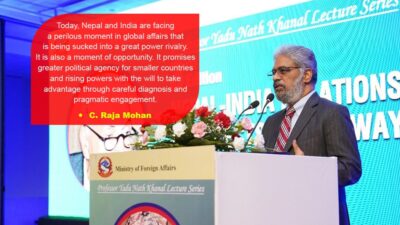
NEPAL INDIA RELATIONS: PROSPECTS AND PATHWAYS
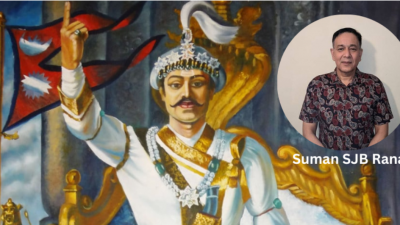
Nepal now and Nepal then

CPC Congress and Nepal’s perspective

We want to be able to give talented students from…
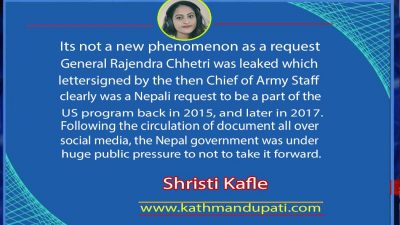
Is SPP chapter really closed in Nepal?

Digital Transformation Solutions and Ecosystem
Top headlines.
- Nepal, India sign long-term agreement on electricity export, materializing MoU reached during PM’s visit 1
- NC, Maoist Centre discuss about NA election 2
- 1.3 kilos of gold confiscated from TIA 3
- Dhakal recommended as SC chief registrar 4
- Govt. forms former-judge Poudel led probe commission to investigate Balkumari incident 5
- Manpower agency owner arrested for cheating more than Rs 1.9 million 6
- President expresses concern over ’emptying’ villages for lack of employment opportunities 7
- PM Dahal stresses on developing innovative agricultural system 8
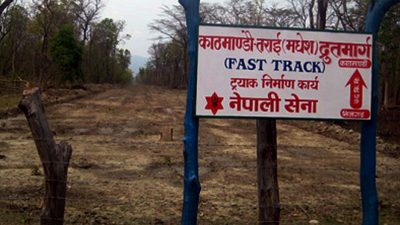
The Role of the Nepalese Army in Strategic Road Projects

A phone call that paved the way for RAW Chief’s visit to Nepal
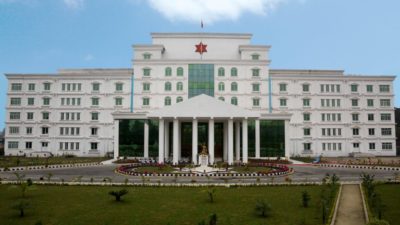
What role has the Nepal Army been playing in controlling the coronavirus?

Nepal Army initiates investigation into case of financial irregularities by Lieutenant Colonel Janmat Karki

Why Are Boys Unexpressive?

Lockdown 2.0: What the Government should do this time around

Forbes-listed billionaire Binod Chaudhary tests positive for coronavirus
- Login / Register

- Intenet & Communication
- Electronics
Information Technology
- Data science and AI
- Biotechnology
- Marketing & Sales
- Startups & Business
- Imports & Exports
- Stock & Investment
- Manufacturing
- Agricultural
- Religion and Culture
- Hotel and Tourism
- Natural Resources
- Metals & Mining
- Infrastructure
- Renewable Energy
Join Our Newsletter
Join our subscribers list to get the latest news, updates and special offers directly in your inbox
Role of social media in Nepali society
The impact of social media in the nepali market, as well as the benefits and drawbacks of social media.

Social media is a platform that connects people from different places using the internet. Nowadays, social media is a must for people because it gives us so much knowledge that we can learn in our lifetime. In today's generation, social media is used by billions of people daily.
In the 21st century, the use of social media has spread all over the world and has an impact on Nepal as well. In the context of Nepal, social media has become an important tool for people. According to the latest report of the Nepal Telecommunication Authority, there are 27.76 million individuals in Nepal who have access to the Internet. While the internet has benefited us in many ways, it has also ruined many people's lives, although this technology is a boon if used wisely. In today's society, using social media has become a necessary daily activity. Social media is typically used for social interaction and decision-making. It is a valuable tool for communicating with others locally and globally, as well as for sharing, creating, and disseminating information. Social media like Facebook, Twitter, Instagram, TikTok , YouTube, and various platforms are used for social sharing.

Globally and in Nepal, social media is now dynamically used for texting, chatting, sharing ideas, views, opinions, and much more. Social media is the greatest human discovery of this generation. Social media is a form of quick access to information. In Nepal, the number of social media users increased by 3.0 million between 2020 and 2021. The number of social media users in Nepal corresponded to 44.2% of the total population in January 2021.
The use of social media has both positive and negative effects on our society, positive effects include:
1. Connecting people
2. Gaining knowledge
3. Non-formal education
4. Learning new skills
5. Increasing communication skills and so on.
Unfortunately, it also has negative effects that include:
1. Social wars or social conflict
2. Different people give different thoughts
3. Cybercrime is on the rise
4. Cannot continue the current generation
5. Decline or neglect of cultural tradition.
However, social media plays a vital role in influencing people about the right things. Awareness can spread among people, and social problems and evils can be thrown out by aware people of their flaws and incidents. Therefore, it plays a vital role in society in people's lives.
- social media
- social network
- social site
Previous Article
Investing in Government Bonds in Nepal - Understanding the Market and the Economy
Next Article
Navigating the Virtual Classroom: The Rise of Virtual Reality in Education
What's your reaction.

Alisha Dahal
Related Posts
Growth of TikTok and its Market in Nepal
Anurag Bhusal Jun 24, 2022 2
Iphone 15 and Iphone 15 Pro in Nepal: Features and Prices
Vivaan Bhatt Sep 13, 2023 0
Problem of Bus Tickets in Nepal
Sanish_T Apr 27, 2023 0
Apple Vision Pro: Revolutionizing VR/AR in Nepal | Price...
Bijay Bastola Jun 7, 2023 0
Top Selling Laptop Brands In Nepal 2024
Sujan Rai Apr 23, 2024 0
Building Ecommerce in Nepal: A Comprehensive Guide
Ashish Bhandari Oct 24, 2023 0
Popular Posts
Top 5 richest person in Nepal
Alisha Dahal May 30, 2023 0
Private Companies in Nepal - A Guide to the Business and...
Alisha Dahal Dec 17, 2022 1
Brain Drain in Nepal: Causes, Consequences, and Solutions
Alisha Dahal Jun 23, 2023 0
The Current State of Business in Nepal: Challenges and...
Anisha Khanal Feb 19, 2023 2
Industrial Development in Nepal: Importance, Sectors, Challenges,...
Anisha Khanal Feb 10, 2023 0
Recommended Posts
Navigating the Virtual Classroom: The Rise of Virtual Reality...
Binod Shrestha May 8, 2024 0
Digitalize your business in Ecommerce Platform: A Marvelous...
sanjivan dhakal Apr 26, 2024 0
Booming Vehicle Rental Industry in Nepal
BijayaMagar Apr 23, 2024 1
Nepali Rudraksha: A Symbol of Divine Connection and Protection
Anurag Bhusal Apr 7, 2024 0
Random Posts
The rise of plant-based meat alternatives.
Anisha Khanal Mar 19, 2024 0
Explore the rise of plant-based meat alternatives, their health benefits, and positive...
Current Situation of Nepalese Agricultural Product
Alisha Dahal Mar 25, 2023 0
Discover the current state of Nepalese agricultural products and the key factors...
20 Things to Consider Before Buying on an E-commerce Website
Swostika Shrestha Jan 7, 2023 0
It's important to keep in mind that there are potential risks and drawbacks to buying...
The Ultimate Guide to Exporting Products from Nepal - Featured...
Dipesh Thakur Dec 3, 2022 0
Get the ultimate guide to exporting products from Nepal, featuring essential information...
Chaudhary Group(CG) Of Nepal
Alisha Dahal Sep 15, 2022 0
Raise of Chaudhary Group (CG)
Popular Tags
- personal finance
- Trekking in Nepal
- digital marketing
- cultural heritage
Voting Poll
- WishesinEnglish
- Birthday Wishes
- Hindi Wishes Shayari
- Nepali Wishes Shayari
- Write for us
- Buddha Purnima
Social Problems and Their Solutions in Nepal
Social problems, evils and their solution in nepal.
We know that all those activities which have carried out to fill full of own’s personal interests misunderstanding at the feeling up others’ and such activities as mentioned below:- Some social problems are immoral, illegal, bad, undesirable, untouchability, third Gender, drug abuse, child labour, domestic violence action of the people in our locality. And All these problems are socially generated, it is our common responsibility and duty to search solution and measures within the society and such problems need to be tackled as possible. Social problems or evils should be abolished to create a peaceful and harmonious in society. First, we discuss the different between of social problems and social evils in our society; as,
• What Social problems are; as,
The personal interesting or to willful one’s personal of the people at the cost of others rights, dignity, health, safety, and socio-cultural values can be called Social problems; such as Girl trafficking, forced, smoking in public, gambling, unwilling physical relationship between two individuals of opposite sex, drug misuse, violence, against women, theft, robbery, kidnapping, murder, rape, corruption, drinking alcohol and misbehaving in public places or at home places these are the examples of social problems. Such social problems are greater hindrances to make the peace, well-being, development of our country, security, harmony etc. And it also affects to How the people react to the certain situation, such examples include; as,
a. Behaviours of social Anti. b. Poverty c. Abuse of Alcohol d. Economic status e. Unemployment condition f. Abuse of drug addition g. Sexual Contraction = Early Pregnant = Rape = Mutilation of Female Genital h. Lack of Education
• What Social evils are
The part or whole of Social norms, values, cultures, rituals and existing in the society which has negative impacts on a particular gender are known as “Social Evils”. Such as caste-based discrimination, gender discrimination, polygamy, Bal Bibah, Child marriage, untouchability, Ghumto Pratha, Jhuma Pratha, Deuki Prabatha, Chhaupadi Pratha, mistreating windows, accusing of women and men as witches, spending excessive money in the name of social and cultural practices, Superstition ( andhabiswas), dowry system ( Daijo Pratha), etc are the examples of social evils and this practices harm the peace, harmony, development in our communities, families or society.
Some major social problems and their solution measures are described below; as,
Advertisement
• Corruption
The misuse of financial authority or authority of any sectors is can be called corruption. Not only in Nepal but also all over the world, Corruption is the greatest challenge for good establishment of a governance. It is also defined as ‘ the dishonest or illegal behavior or doing illegal work or misusing own authority”. Thus, corruption should also be defined as “Misuse of authority”. In some cases; People of Higher post of administration accept money in the form of bribe for doing the work of that person. If someone fails to give bribe, that person’s works should be either never done or done after quite long time. That work should be accepted sometimes illegal financial offers as the commission from the parties which are expecting to get the contract of some big projects of the government.

Generally, Corruption is caused lake of a feeling of responsibility, duty, and nationality, because of the low Expectation, the lake of the low implementation, desire to be overnight billionaire etc. It is the effects to develop the country. That should be demoralized the image of the countries in the all over the world. Because of corruption, the peace of development of any country should be slower and it will cause loss of the faithful of the people in the government services.
SEE Also: 15 major social problems, evils, and inequalities in Nepal
• The solution or measures of corruption are mentioned in points; as,
a. Leave to luxurious b. Social boycott to the corruption people c. Establish of a good governance d. Political parties should be different political commitment e. Enhance of “Transparency” f. To develop accountability and responsibility among them g. End of commercialization of public service ( education & health) h. Necessary laws should be formulated ( should be amended if necessary and should be implemented strictly) i. The power of Commission for the Investigation of authority ( CIAA) should be expanded. j. The work of constitutional organization should be made effective and efficient.
The use of superior strength or influence to intimidate someone, typically to force someone to do something, is can be called Bullying. It is the one types of the acts of the acts of intentionally, causing harm to others, through verbal harassment, assault of physical, other more subtle method of coercion as a manipulation. This practice is mostly practiced in campus, universities, school, workplace, It is also called peer abuse. Phycology studies that the person who is abused their group are at risk of mental health problems like stress, tension, fears, independent, etc so they think to do suicide.
related searched terms: essay on social problems in Nepal list of social problems in Nepal social problems and their solutions in Nepal introduction of social problems in Nepal causes of social problems in Nepal major social problems in Nepal
• The solution or Measures of Bullying ;as,

a. Make all the people are respected b. Create an identity –safeguard c. Create the trust that should help them to connect the young people. Make them educate. e. Provide the opportunities for students to shear his/her feeling to other
Related Posts
Celebrating the spirit of freedom: reflecting on nepal’s democracy day.
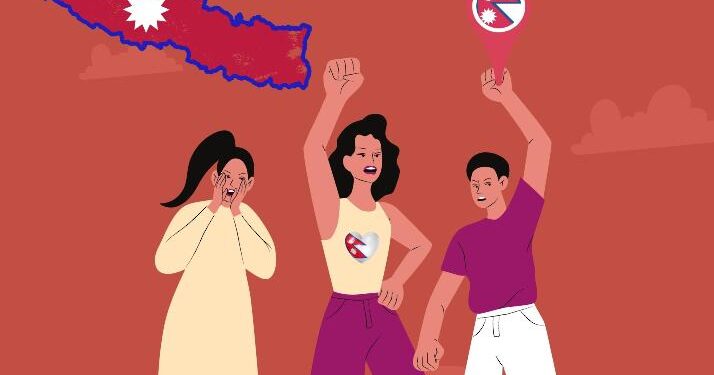
A Day of Reflection: What Democracy Means to Nepal in the 21st Century

The Most Popular Traditional Sports in Nepal

How Does a Nepali Welcome a Guest?

Three Remarkable Nepalese Figures Who Shaped History

6 Best Music Stores Around Kathmandu Nepal

Recent Posts
- आनंद के अनुभव: बुद्ध जयंती के अवसर पर शुभकामनाएं भेजें Buddha Jayanti Wishes in Hindi
- 100 Happy Buddha Purnima Wishes For This Year 2024
- 90 Happy Buddha Purnima Status On Facebook For This Year 2024
- वट सावित्री के इस पावन अवसर पर अपनी सहेलियों को भेजें शुभकामनाएं Vat Savitri Wishes in Hindi
- Reasons And Treatment for Congenital Heart Valve Disease

- Privacy Policy
© 2023 Wishes, Messages, Travel, Lifestyle, Tips in English, Hindi and Nepali Mount Everest. Legal Support by Quotes .
- Travel, Information And Lifestyle Blog For Nepal & Nepalese People

COMMENTS
Good people do well to the society where as the bad one harms the society. These bad people introduce social evils like theft, robbery, untouchability and other forms of social discrimination. Early marriage, polygamy, dowry system, drug addiction, girls trafficking etc. are other examples of social evils. They harm the feeling of equality and ...
Introduction A social problem is a social condition that a segment of society views as harmful to members of society and in need of remedy. Social problems are the general factors that affect the society. Social problems often involve problems that affect real life. It also affects how people react to certain situations. People practice and promote social evils because they are ignorant of the ...
Some of the main causes of social problems and evils are as follows: Advertisement. (a) Superstitious beliefs. (b) Radical values and beliefs. (c) Poverty, unemployment and inequality. (d) Illiteracy. (e) Corruption, lust for money and consumerism. (g) Population explosion and urbanization.
social problems and contextualizes these issues within the cultural, economic, and political spheres of Nepal. In this course, you will be asked to explore social issues in Nepal, with the goal of fostering a more nuanced worldview and expanding global consciousness, looking beyond western perspectives for "solutions" to these social problems.
The first is a report on the "Nepal Social Inclusion Survey (NSIS) 2018," a national sample survey, that presents data and analysis disaggregated by sex, 11 broad social groups, and 88 distinct caste and ethnic groups. The NSIS provides data for tracking changes in a number of key indicators between ...
But indigenous peoples' per capita is Rs.13,300, Madhesis' Rs. 10, 461, Dalits' Rs. 9,202 and Muslims' Rs. 8,483. The national literacy rate of Nepal is 53 percent, but it is 48.8 percent among indigenous peoples, 21.3 percent among women, 36 percent among Dalits, 32 percent among Madhesi and 27 percent among Muslims.
Nepal has succeeded in reducing multidimensional poverty by 12.7 percent between 2014 and 2019, and its Human Development Index has improved, as have indicators related to health and education.
Beating Nepal's 'social evil': Terai women rise up against the dowry system By Rajkumari Gurung, ActionAid Nepal June 2009 About this series, 'Stories from the Frontline' "tories fro the Fro tli e e erge from an Impact Assessment and Shared Learning (IASL) initiative to support critical thinking about and documentation of ActionAid I ter atio al s rights-based work for transformation and ...
To highlight the existing forms and patterns of social discrimination experienced by people of Nepal on the grounds of their caste, ethnicity, gender, and religion-based identities, 2. To draw attention to the differences of social discrimination experienced by people of the aforementioned social categories, 3.
Based on results of the Center for Nepal and Asian Studies (CNAS) Social Exclusion Survey of 2890 households, we find that regardless of background characteristics, a majority of people report socio-economic improvements, more ethnic integration and less discrimination. Although traditionally excluded caste, ethnic and religious groups are ...
1. Background. The socio-economic and political injustice in Nepal has given rise to the unequal social relationships along the lines of class, caste, gender, ethnicity, religious and regional disparities and ever widening the gap between the rich and poor. The striking features of under-development in Nepal - rampant poverty, unequal ...
Nepal is one of the underdeveloped countries of the world. There are different social problems and evils in the society. Social problems and evils are issues which affect the members of a society. A social problem is normally a term used to describe problems with a particular area or group of people in the world. Some of the common social evils ...
By far, the largest social groups are Indigenous peoples called adibasi janajati. They include 59 groups 2 constituting 35% of the total population. Similarly, Dalits and Muslims constitute 12.60% ...
on the status of Sociology in Nepal, this is the second book-length volume on the subject.1 Sociology, in terms of its presence at universities in Nepal 1 The first one, The State of Sociology and Anthropology: Teaching and Research in Nepal by Madhusudan Subedi and Devendra Uprety, was published by Martin Chautari in 2014.
A new understanding among political parties including the Maoists in 2006 provides hope for building a new Nepal. A politico-economic structural change is required to enhance village/rural economy along with human and social capital enrichment strategies that will pave the way to break the poverty cycle.
The concept of 'evil' appears to have led many people to look beyond commonly discussed social problems such as drugs, poverty or social exclusion, to express more fundamental, less tangible fears about the nature of society and how it is changing. The debate about contemporary social evils did not reveal any strong discomfort with ...
In Nepal, cultural and social evils are massively referred motivational factors by the activists. ... Vocabulary of social evils dwells in the inter-generations and inter-individuals self-location in different orders. ... Oommen, T.K.2004. Nation, Civil Society and Social Movements Essays in Political Sociology. New Delhi/Thousand Oaks/London ...
KathmanduPati October 25, 2021. Sonika Lamichhane / KATHMANDU - Social media is a popular tool that facilitate people to create and share information, ideas, hobbies, and other kinds of expression through virtual spaces. People use social media to share, write, and meet new friends on the internet. When the Internet was launched in the 1980s ...
Social problems and evils are issues which affect the members of a society. A social problem is normally a term used to describe problems with a particular area or group of people in the world. Some of the common social evils would be alcoholism, racism, child abuse, etc. It also affects how people react to certain situations. Nepal is facing a ...
In Nepal, the number of social media users increased by 3.0 million between 2020 and 2021. The number of social media users in Nepal corresponded to 44.2% of the total population in January 2021. The use of social media has both positive and negative effects on our society, positive effects include: 1. Connecting people. 2. Gaining knowledge. 3.
angst satirically against the era long evils and weaknesses in an artistic way" (146 ). Rarely Bhupi's poems are romantic, and a very few poems are about love and women. Most of his poems rumble around social issues, human relationship, environmental issues and economic issues. In this regard the trend of Nepali poetry
Social Problems, evils and Their solution in Nepal. We know that all those activities which have carried out to fill full of own's personal interests misunderstanding at the feeling up others' and such activities as mentioned below:- Some social problems are immoral, illegal, bad, undesirable, untouchability, third Gender, drug abuse, child labour, domestic violence action of the people in ...
The first essay is a long essay on the Social Evils of 400-500 words. This long essay about Social Evils is suitable for students of class 7, 8, 9 and 10, and also for competitive exam aspirants. The second essay is a short essay on Social Evils of 150-200 words. These are suitable for students and children in class 6 and below.